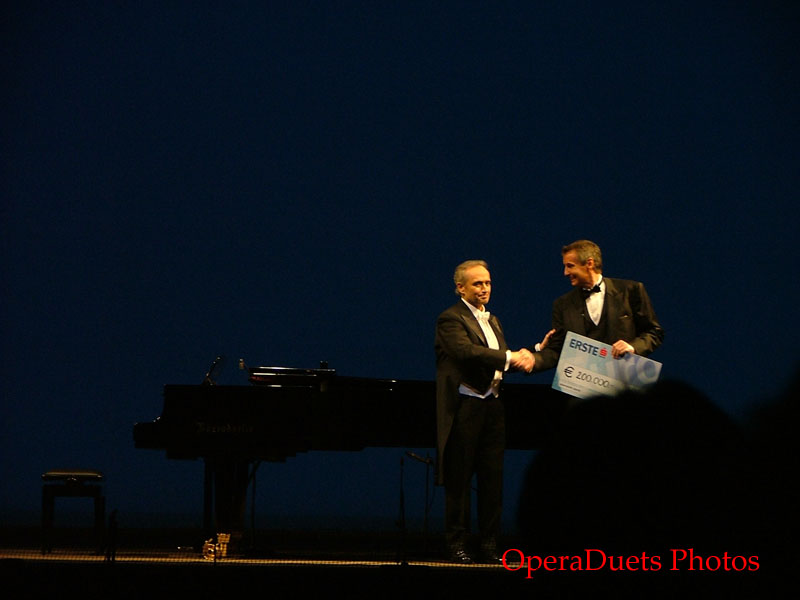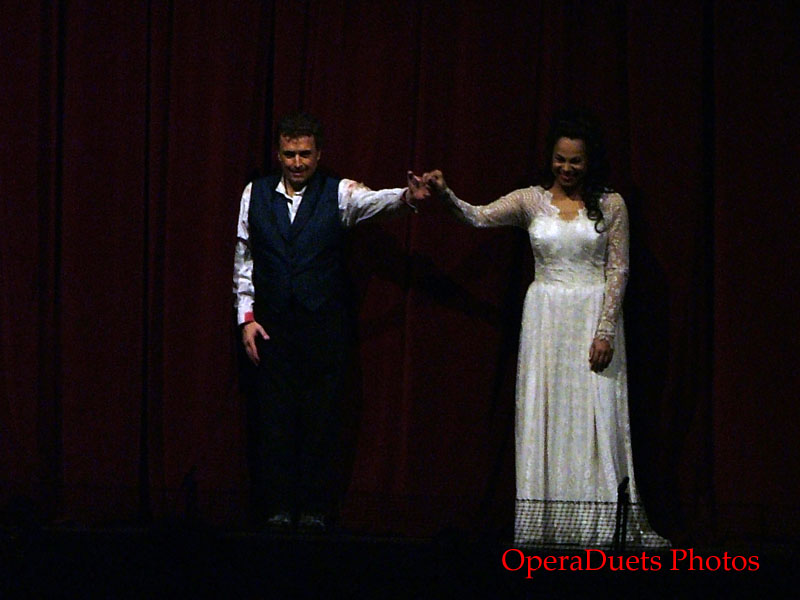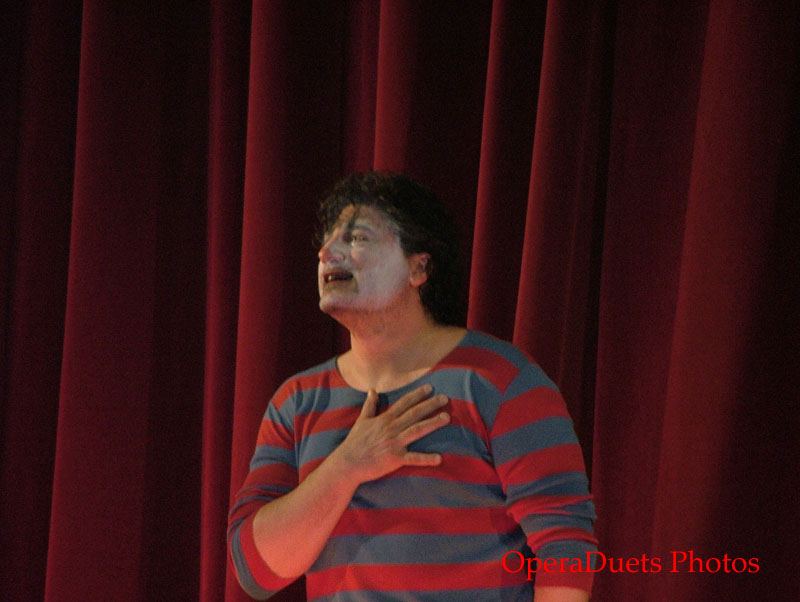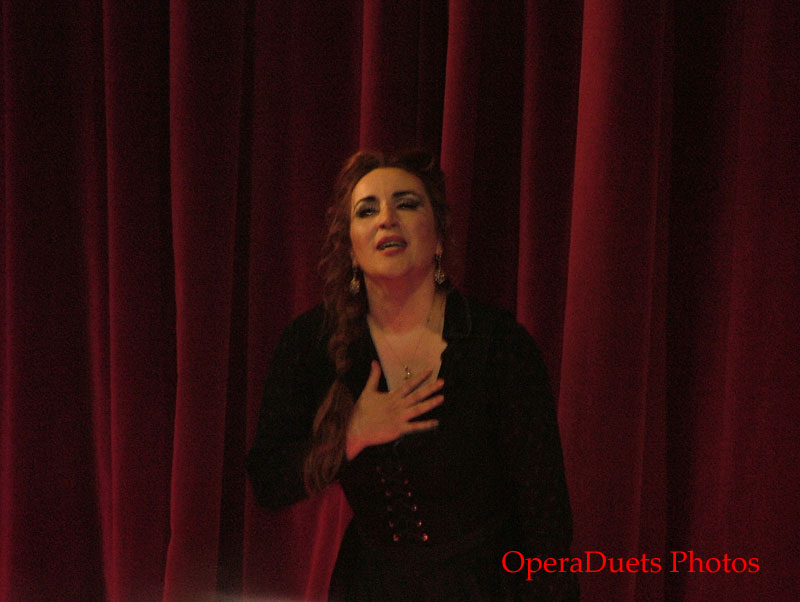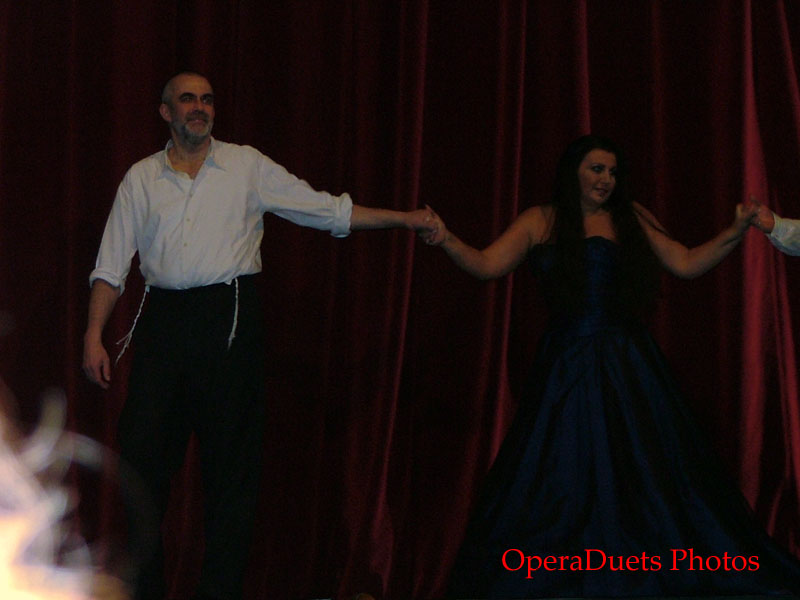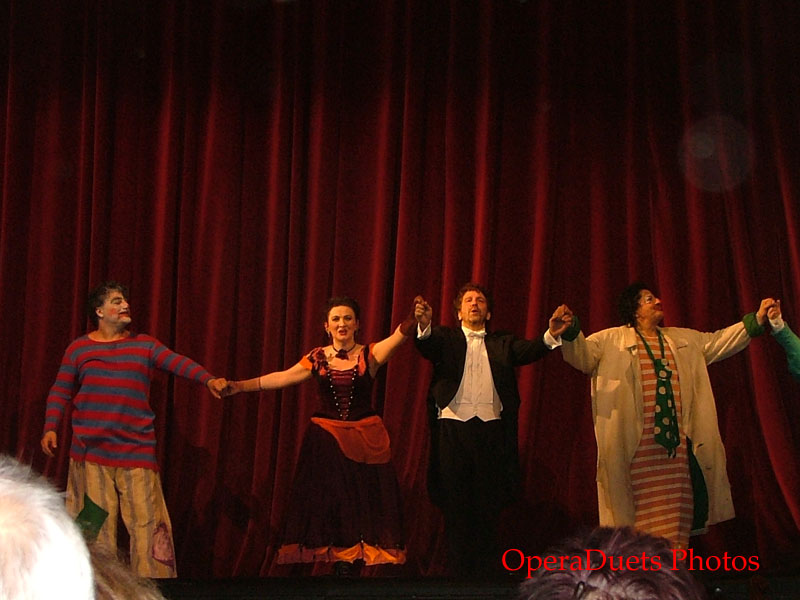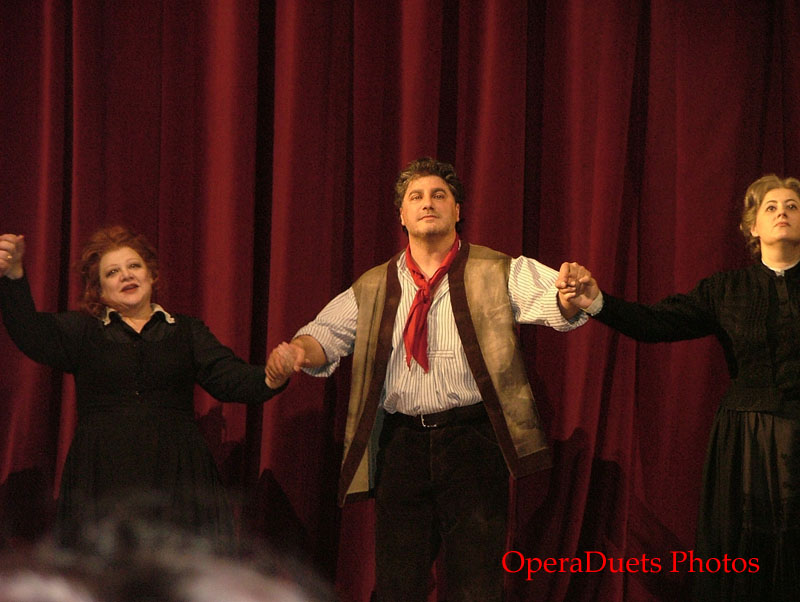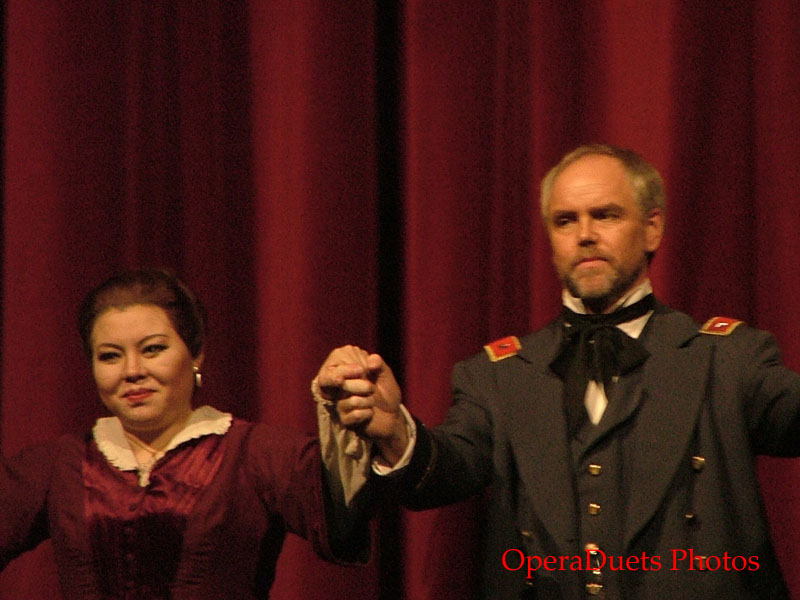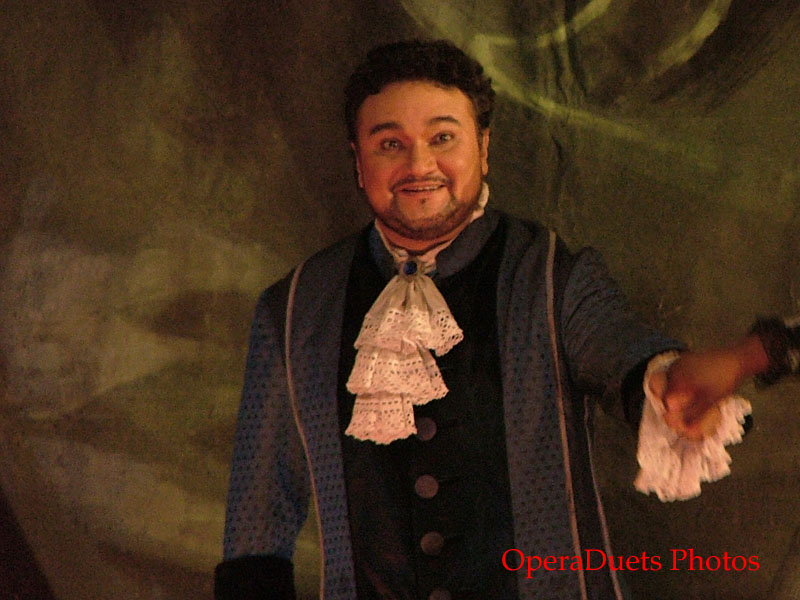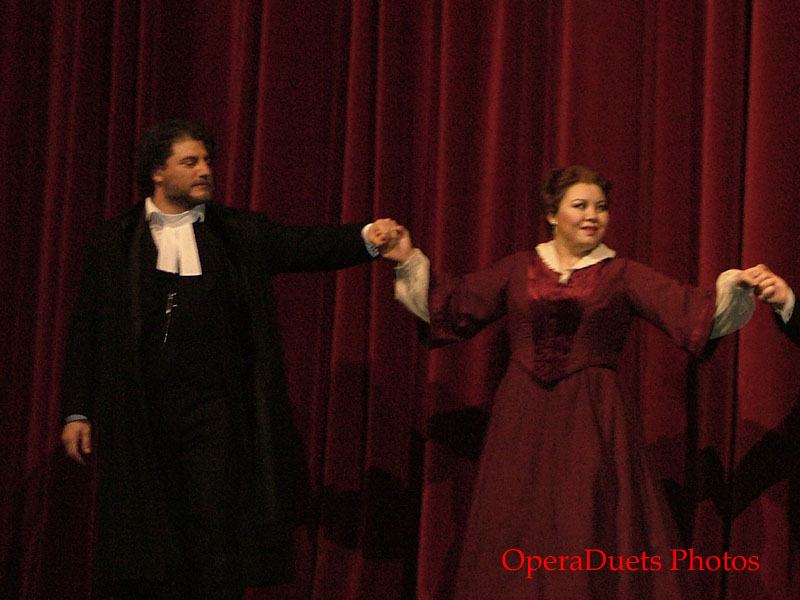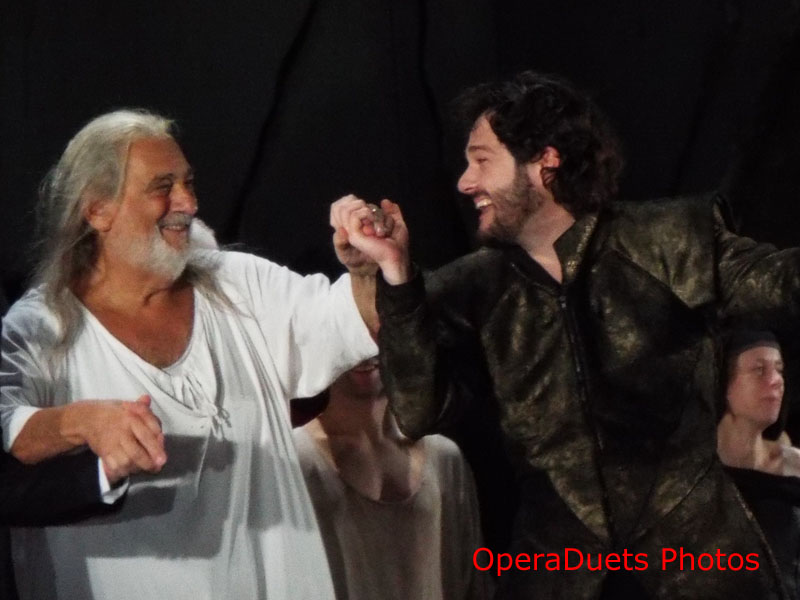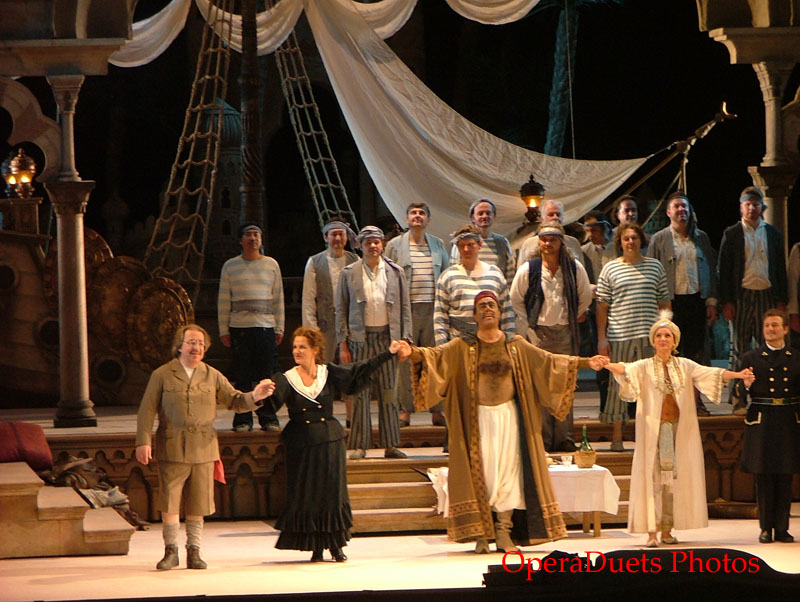2003-03-17 Tosca (G.Puccini), Wiener Staatsoper
Mario Cavaradossi = José Cura
Floria Tosca = Isabelle Kabatu
Baron Scarpia = Franz Grundheber
Cesare Angelotti = Janusz Monarcha
Der Mesner = Wolfgang Bankl
Spoletta = Benedikt Kobel
Sciarrone = In-Sung Sim
Ein Schließer = Günther Groissböck
Stefano Ranzani, conductor
Wiener Staatsoper
Montag, 17. märz 2003
473. Aufführung in dieser Inszenierung
Tosca
Melodramma in drei Akten nach Victorien Sardou von Luigi Illica und Giuseppe Giacosa
Musik von Giacomo Puccini
Dirigent Stefano Ranzani
Inszenierung Margarethe Wallmann
Bühnenbild und Kostüme Nicola Benois
Chorleitung Ernst Dunshirn
Ein Hirt Kind der Opernschule
der Wiener Staatsoper
Orchester der Wiener Staatsoper Bühnenorchester der Wiener Staatsoper
Chor der Wiener Staatsoper Kinder der Opernschule der Wiener Staatsoper
Tosca with José Cura as Mario Cavaradossi.
On 16th March 2003, I took a fall in a McDonald's restaurant. After coming to my hotel, I found out that I needed a doctor. He came, I got a kind of bandage on my right wrist, and a sport gel tube and some pill to kill the pain. After a not so pleasant night, it was 17th March 2003, and pain went and came again and again.
But I was not to miss Tosca, I already had a ticket, and I hope that the opera would be so great that I could forget pain and just be in operaland for 3 hours. But no, my loge was on the wrong side for getting to see the action. I blame the director, naturally. It was not a cheap ticket, and since I lost so much of act 2 and 3, like seeing how Jose Cura looked when singing "E lucevan le stelle".
The conductor was, I think really good. This was a good production, except when it was about situating the principals too much one side, making part of the audience suffering, to see nothing that was interesting that is. Isabella Kabatu was a great Tosca, and Grundheber a great Scarpia. I didn't find Cura a great Cavaradossi, but that was after his stupendous performance of Don Carlos.
'
The overall impression a weak Tosca performance, since it did not take my pain away.
I hardly heard Cura's voice. And how on earth am I to know if Cura sang a fantastic "E lucevan le stelle", I had lean over heavily to see his voice, had pain, and his voice was soooo weak when I compare to Don Carlos in Act 2 Scene 2. Cavaradossi died, and I did not care, Tosca jumped to her death, and I did not care.
I had some hope of seeing Cura backstage, and I did see him through the window, but all the people, and my pain. No, I had to protect myself from further pain, beside I hardly could operate my camera because of the pain. Well, I had promised some photos to my Cura Connexion friends, and I went to her hotel, wrote a not with my left hand, I also told the portier what I wrote so that the meaning would come through, and left some photos there. And then I went back to my hotel. The next day, 18. March was my home-going day.
well, Tosca is not so important for me, Don Carlos is. so Great TRAVEL, anyway
next time, please, I want to be lucky with the combination Cura and Tosca!!!
PS.
Lot of people enjoyed this Tosca, and especially José Cura as Cavaradossi. My excuse was my injury that made it harder to enjoy an opera performance. If I were rich I would have gone back to Vienna for another Tosca, tomorrow on 27. March is the last Tosca with Cura in Vienna for 2002/2003.
OD Travel + Photos
Saturday, March 17, 2018
March 17, 2003: Tosca in Vienna
Posted by
operaduets
at
Saturday, March 17, 2018
2
comments
![]()
Labels: 03_March, 03-17, 2003, Austria, Franz Grundheber, GIACOMO PUCCINI, Isabelle Kabatu, José Cura, Opera, TOSCA, Vienna
Wednesday, March 14, 2018
March 14, 2003: Don Carlo in Zurich
2003-03-14 Don Carlo (G. Verdi), Opernhaus Zurich
Filippo II = Carlo Colombara
Don Carlo = José Cura
Rodrigo = Franco Vassallo
Il Grande Inquisitore = Pavel Daniluk
Un Frate = Giuseppe Scorsin
Elisabeth de Valois = Elena Prokina
La Principessa d'Eboli = Luciana D'Intino
Tebaldo = Judith Schmid
La Contessa d'Aremberg = Susanne Merle
Il Conte di Lerma = Leonardo Silva
Voce dal cielo = Sen Guo
Pier Giorgio Morandi, conductor
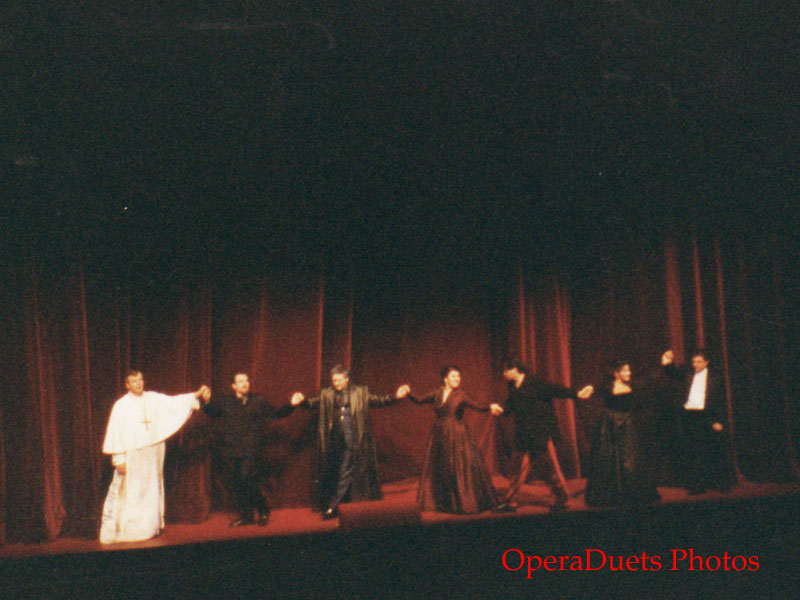
Verdi: Don Carlo
Musikalische LeitungPIER GIORGIO MORANDI
InszenierungWERNER DÜGGELlN
SpielleitungULRICH SENN
BühnenbildRAIMUND BAUER
KostümeSUE WILLMINGTON
LichtgestaltungJÜRGEN HOFFMANN
Chor ERNSTRAFFELSBERGER
Deputati fiamminghi/PETER KÁLMÁN, VALERIY MURGA,
Grandi di SpagnaSERGEY AKSENOVo, KEVIN ARMSTRONGo, MIRKO JANISKA
ERIC KELLERo, SEUNG-HYUK PARKo, FEDERICO SACCHlo
0 Mitglied des 105
CHOR DES OPERNHAUSES ZÜRICH
ZUSATZCHOR OPERNHAUS ZÜRICH
STATISTENVEREIN AM OPERNHAUS ZÜRICH
ORCHESTER DER OPER ZÜRICH
Solo-CelloLuciano Pezzani
Musikalische Assistenz
und EinstudierungTHOMAS BARTHEL, THOMAS GRABOWSKI
InspizienzPAUL SUTER
SouffleurLORENZO COLADONATO
Freitag, 14. März 2003FREITAG-ABO A
PAUSE NACH DEM ZWEITEN AKT BEGINN: 19.30 UHR
ENDE: ca. 23.00 UHR
Voce dal cielo
Sen Guo: In the autodafé-scene, her voice is heard at the end of this scene, when the heretics are burnt, tortured. A lovely voice promises the poor tortured souls that heaven is open for them. Beautifully sung by this Chinese soprano.
Il Conte di Lerma
Leonardo Silva: Good.
La Contessa d'Aremberg
Susanne Merle: She is the one that is expelled from the Spanish court for not being together with the Queen at the meeting of Elisabeth & Don Carlo. The King in this way offend also the Queen. The Queen comforts her compatriot, she is not expelled from the heart of the Queen ("Non pianger, mia compagna"). Silent role. Tall, blond woman, skinny. An actress, or a just a member of the chorus.
Tebaldo
Judith Schmid: a trouser role for this Swiss mezzo. Walking and acting very much like a young man, which is her role. In this Zurich version it is Tebaldo who announces people coming in, and not the Count of Lerma like in the Salzburg 1986-version.Very good voice and acting.
La Principessa d'Eboli
Luciana d'Intino: this Italian mezzo is today's great Eboli. Amneris and so on. Her dark voice have an agility for coloratura even though her voice is a big one. And she even acts...All opera singers are supposed to act, but still some really can't do that and sing at the same time, Luciana has no problem with that. Onstage never for a second, is she not Eboli. Her passion, witty and loves clearly portrayed by Luciana d'Intino. Her song of the veil is great, and she is great in duos, trios and quartets, and her O don fatale is stupendous.
Elisabetta di Valois (Elisabeth de Valois, Queen of Spain)
Elena Prokina: great singing and acting by this Russian soprano. She does well her big aria in the end of the opera, Tu che le vanita, even though she doesn't quite have the big voice to really get it right. She is the Queen of this opera, regal in presence, and still gets the human side of Elisabeth to stand out like a real human being. The confrontation with the King, as a King's daughter she has greatness and is not easily intimidated. She shines, she acts very well with all the other members in the ensemble.
Un frate (The imperator Carlo Quinto?, Charles V)
Giuseppe Scorsin: the 3rd bass in Don Carlo. In this production we don't see him, we only hear him and the other monks at the monastery San Juste, in the beginning and the end of the opera. Good.
Il Grande Inquisitore
Pavel Daniluk: the 2nd bass. I have to say he does OK, I wonder if he lacks some of the deepest notes when he sings SiRe, it doesn't seem to go easily down. Good.?
Rodrigo, Marchese di Posa
Franco Vassallo: A really great Rodrigo sung and acted by this Milanese baritone. In flesh and blood real, but still a dreamer. GREAT!!!
Don Carlo (Don Carlos, Infante of Spain)
José Cura: Bravo, Cura! I don't understand how you do that, managing to play so perfectly a Don Carlo closer to the historical truth than we usually see, and still not break against Verdi's Don Carlos. Magic... Hard work.
Filippo II (Philip II of Spain)
Carlo Colombara: the 1rst bass of Don Carlo. An unhappy father and spouse. He has a misfit as son and a wife who never loved him. Great singing an acting by this bass.
Pier Giorgio Morandi and the orchestra....
He did a good job, Morandi, but still something the orchestra drowned the singers.
BRAVI tutti
OD Travel + Photos
Posted by
operaduets
at
Wednesday, March 14, 2018
0
comments
![]()
Labels: 03_March, 03-14, 2003, Austria, Carlo Colombara, DON CARLO, Elena Prokina, Franco Vassallo, GIUSEPPE VERDI, José Cura, Luciana d'Intino, Opera, Switzerland, Zurich
Monday, March 12, 2018
March 12, 2003: Don Carlo in Zurich
2003-03-12 Don Carlo (G. Verdi), Opernhaus Zurich
Filippo II = Carlo Colombara
Don Carlo = José Cura
Rodrigo = Franco Vassallo
Il Grande Inquisitore = Pavel Daniluk
Un Frate = Giuseppe Scorsin
Elisabeth de Valois = Elena Prokina
La Principessa d'Eboli = Luciana D'Intino
Tebaldo = Judith Schmid
La Contessa d'Aremberg = Susanne Merle
Il Conte di Lerma = Leonardo Silva
Voce dal cielo = Sen Guo
Pier Giorgio Morandi, conductor
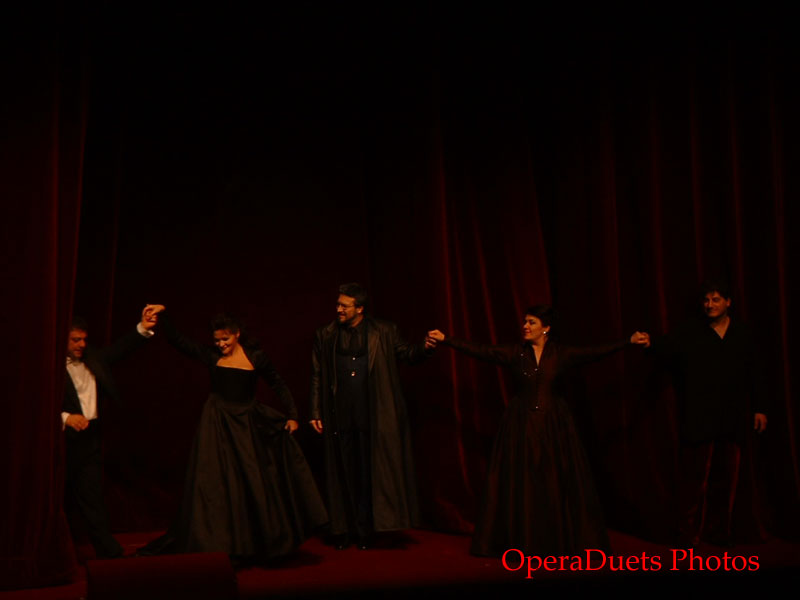
Verdi: Don Carlo
Regie Werner Düggelin
Musikalische Leituug PIER GIORGIO MORANDI
Inszenierung WERNER DÜGGELlN
Spielleitung ULRICH SENN
Bühnenbild RAIMUND BAUER
Kostüme SUE WILLMINGTON
Lichtgestaltung JÜRGEN HOFFMANN
Chor ERNST RAFFELSBERGER
Deputati fiamrninghi/PETER KÁLMÁN, VALERIY MURGA,
Grandi di Spagna SERGEY AKSENOVo, KEVIN ARMSTRONGo, MIRKO JANISKAo,
ERIC KELLERo, SEUNG-HYUK PARKo, FEDERICO SACCHr
0 Mitglied des 105
CHOR DES OPERNHAUSES ZÜRICH
ZUSATZCHOR OPERNHAUS ZÜRICH
STATISTENVEREIN AM OPERNHAUS ZÜRICH
ORCHESTER DER OPER ZÜRICH
Solo-Cello Luciano Pezzani
Musikalische Assistenz
und Einstudierung THOMAS BARTHEL, THOMAS GRABOWSKI
Inspizienz PAUL SUTER
Souffleur LORENZO COLADONATO
Mittwoch, 12. März 2003 FREIER VERKAUF
PAUSE NACH DEM ZWEITEN AKT BEGINN: 19.30 UHR
ENDE: ca. 23.00 UHR
Act 1 Scene 1
This is the Italian, 4 act version. Which starts in San Juste, with the monks singing "Carlo, o sommo Imperatore". The stage is black, and we do not see the monks, they are singing ofstage. Don Carlos is
already onstage, Jose Cura is laying down, making a pathetic figure, "Io l´ho perduta", he is mourning the loss of Elisabeth de Valois, his once-fiancee, who had to marry the King, Filip II, his own father for political reasons. Luckily the voice of Cura was improved after the first minutes here. Don Carlos´ friend, Rodrigo sees Don Carlo, the Infante of Spain in quite a mood. But Rodrigo makes Don Carlos think of the Flemish people in need, Jose Cura and Franco Vassallo sings a wonderful "Dio che nell'alma infondere", even though Cura is sometime of of synch, so the conductor Morandi must take special care and point to Cura, when he is on cue. When Filip II
and Elisabeth de Valois comes in to pray, they and the 6 "bodyguards" walks to fast for a royal prosession I think.
Act 1 Scene 2.
It is in bright blue, with some wonderful scenery, the court ladies is making a big picture of Fontainebleu, for the queen. Tebaldo is walking around like a teenager with an important job. Then Pricess Eboli arrives and soon a happy song of the veil, Muhammed and his queen. Eboli, Luciana d'Intino receives the first applause, she
is fantasic. Coloratura-alto. Then the queen arrives, Elena Prokina is Elisabeth de Valois. And the Rodrigo, Grande de Espana, comes with one secret message from Carlos, and one official from the royal Queen
mother in France. And soon a terzett "Che mai si fa nel suol francese", where Rodrigo efficiently and elegantly stops Eboli from casting the eyes at the Queen, finding something suspicious. And then Don Carlos comes to talk with his "mother" (step-mother, naturally), and Jose Cura starts very softly but is soon angered by Elisabeth de Valois "coldness", Elisabeth speaks of honnour and Carlos wants to talk about love. "Io vengo a domandar" ends with Elisabeth telling about murder his father, and marry his mother. "Maledetta io son",
and Carlos runs out. Then the King, Carlo Colombara, come in and see the queen alone, that is against the etiquette of the Spanish court. ONLY, that when the king arrives, the court woman have arrived a
little too soon... The Lady of Honnour who was supposed to be with the Queen, gets the message from the King, go back to France. So the queen looses her compatriot at the court, "Non pianger, mia compagna". Elena Prokina is a little out of synch and conductor and singer tries to get intact. Then all is leaving, but The king want to talk to Rodrigo". Great Duet ("Restate!")
Act 2 Scene 1
In the Queens Garden, Don Carlo (Jose Cura) is waiting for his beloved, Elisabeth de Valois to come for a secret rendez-vous. But it is naturally Princess Eboli (Luciana d'Intino) who comes. She thinks the Infante loves her, Eboli, but then realise that the sweet words was meant for somebody else, ... the Queen. A fantastic Duet that becomes a wonderful Trio, when Rodrigo (Franco Vassallo) comes in to save Don Carlo when the rage of a jilted woman. My favourite scene in this opera. Rodrigo makes Don Carlo give som letters about the revolt they are planning in Flandern, and some love letters.
Act 2 scene 2 Autodafe-scene.
Grand scene with all people gathered to have a feast, when "enjoying" the death of sinners condamned by the Spanish Inquisition. The King, Carlo Colombara, restates his vow to be the protector the Cathotic faith. "Gloria a Filippo, gloria al ciel'!" Then suddenly Don Carlo comes in with the Flemish deputation to ask of clemency for Flandern and Brabant, something the King and the Monks refused, but the people with Elisabeth and Rodrigo asks for clemency also. Don Carlo loses his patience, and ask of to reign Flandern and Brabante (Sire! egli e tempo ch'io viva), when the King refuses this, Don Carlo threaten his father with a sword. Only Rodrigo asks for the sword from the Infante. The crisis is over. And the celebration of death of the heretics can continue. A voice from Heaven, promises the "heretic" salvation.
Intermession
Act 3 Scene 1
In the chamber of the King Filip II, Carlo Colombara is singing the wonderful aria "Ella giammai m'amo". Elisabeth has never loved the King, and the Infante is rebelling against his father. Filip thinks that his crown makes it possible to read the mind of others, the king has a very suspicious mind. He long for peace, to sleep in Escorial, the royal grave. More misfortunes, the Grand-Inquisitor comes in, and two basses are battling against each-other, why must the crown always bend for the altar. Grand-Inquisitor gives the king permission, to excile or death to the Infante, but he wants the life of Rodrigo of Posa, The king tries to resist... And after this The queen comes asking for justice, someone has robbed her of the box inwhich all her juwellery is in. Filip has it, he opens it a finds the portrait of Don Carlo. He accuses Elisabeth of being an adulteress, she swoons, Rodrigo and Eboli rushes in. Wonderful quartett. It is Eboli who has stolen it, and told Filip about Elisabeth and Carlos. She asks for forgivesness, is almost forgiven but the she has more on her hart, the King has seduced Eboli, this can not be forgiven, Eboli gets the choice of excile or the convent. Then comes the BIG moment, "O don fatale", where Eboli mourns the loss of her queen, never to see her again, a curses her own beauty that have made her so vain. Then she remembers Don Carlo, he is condammed to death, One day I have left, I can save him.
(This is what I call a highlights-only scene)
Act 3 Scene 2
The prison of Don Carlos. Rodrigo comes to visit his friend. He has saved him, the letters have been found in Rodrigos room. "Per me giunto e il di supremo". And then when the bullet come, he tells Carlos that his "mother" knows everything, go to San Juste, she will meet you there, YOU can save Flandern. Rodrigos has just died, when Filip II comes to give his son the sword back. Don Carlos refuses, since The king has killed the best friend, he gave his life for me. The people wants the Infante, the Grand-Inquisitor comes to calm all down, prostrate to your King.
Act 4
San Juste. Elisabeth de Valois, Elena Prokina sing her Great Aria "Tur che la vanita", about Carlo V, Charles V. Then Cura and Prokina have their last duet. "E dessa! - Ma lassù ci vedremo in un mondo migliore". At last Don Carlo is ready to forget Elisabeth and to use all his force to the Flemish cause. But the the King and Grand-Inquisitor appear. They demand both deaths. And then the opera ends with the monk, and they all are afraid since they hear the voice of Carlo V, the grand-father of Don Carlos. In the confussion, Don Carlo and Elisabeth disappair into the monastery San Juste.
First time I know that Elisabeth was saved, too!!
GREAT OPERA
Bravi, tutti!
OD Travel + Photos
Posted by
operaduets
at
Monday, March 12, 2018
0
comments
![]()
Labels: 03_March, 03-12, 2003, Austria, Carlo Colombara, DON CARLO, Elena Prokina, Franco Vassallo, GIUSEPPE VERDI, José Cura, Luciana d'Intino, Opera, Switzerland, Zurich
Sunday, March 11, 2018
March 11, 2003: La Favorite in Vienna
2003-03-11 La Favorite (G. Donizetti), Wiener Staatsoper
Léonor de Guzman = Violeta Urmana
Fernand = Giuseppe Sabbatini
Alphonse XI = Carlos Alvarez
Balthazar = Giacomo Prestia
Don Gaspar = John Dickie
Inès = Genia Kühmeier
Fabio Luisi, conductor
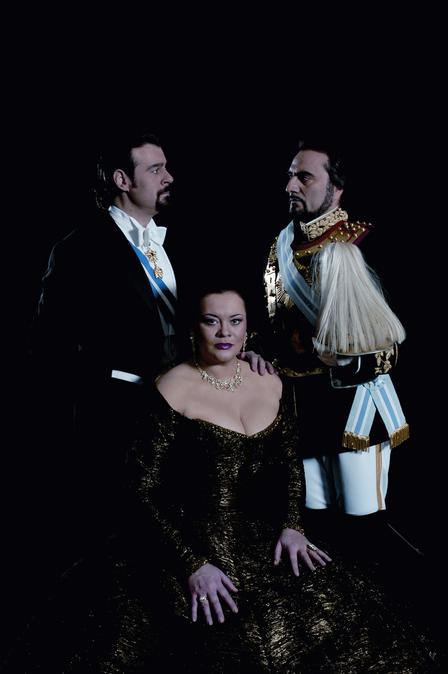
Wlener Staatsoper
dienstag, 11. märz 2003
6. Aufführung in dieser Inszenierung
La Favorite
Oper in vier Akten
Text von Alphonse Royer und Gustave Vaëz
in Zusammenarbeit mit Augustin Eugène Scribe
Musik von Gaetano Donizetti
Dirigent Fabio Luisi
Inszenierung John Dew
Bühnenbild Thomas Gruber
Kostüme José-Manuel Vazquez
Choreinstudierung Marco Ozbic
Orchester der Wien er Staatsoper
Chor der Wiener Staatsoper
To start an opera evening by coming to the opera house 10 minutes before the opera starts is not the best way, but I soon calmed down to enjoy this, for me almost unknown opera. Knowing only "Spirto gentil" and "O mio Fernando" of this opera. But here they sang in French.
Having read the critic on beforehand, I was not too disappointed by the tenor singing of the top notes, they hurt my ears. After the tenor first aria, polite applause from the audience, they respects very much Giuseppe Sabattini. First act is in the convent where Fernand is a novice, the abbed wants Fernand to take the vows, but Fernand has met a very beautiful woman and is in love. Baltasar throws Fernand out of the convent, since F. does not want to forget the unknown woman. Next scene. An island where Leonor and her maids is enjoying life, Fernand comes there. He wants to marry Leonor, but she refuses, says she cannot and beseeches Fernand to forget her. He will not. Wonderful duet.
Act 2. The king and Leonor, with Ines and Don Gaspar in the royal garden of the moor king that Fernand have helped King Alphonse to win over. The king understands not that Leonor can be unhappy with being his mistress. The court despise Leonor, but the King sings of his great love, and Leonor tells that he deceived her to think that she was following her husband, when she left her father castle. Bah, I want to make you my queen. Then Don Gaspar, the courtier, has found out that a love letter to Leonor was given Ines, he gives the king the letter, who gets very angry with Leonor, especially since she refuses to give him the name of her lover. Then Baltasar comes with an urgent message from the pope, if the King and his mistress does not depart for ever, by the next day, they are excommunicated. In vain Alphonse tries to threaten Baltasar, King against the Church. The queen is there, thinking she can win over Alphonse to her side, just by evicting Leonor.
Act 3. The kings palace. Aphonse wants revenge. Fernand comes as a hero, and he wants a noble woman as a bride, suddenly A. finds out that F. is his rival. The perfect revenge is clear, marrying of his mistress to the hero, who does not know that this is a clear way to loose his honor, something Leonor knows perfectly. "O mon Fernand", wonderfully sung by Violeta Urmana. She orders Ines to tell Fernand all, but Ines is taken prisoner by Don Gaspar on the command of the king. She thinks Fernand know it all and still wants to marry her. But know this only gets cleared when the contempt of the court, and Baltasar is told about the wedding. Fernand you have lost your honor, marrying the mistress of the King. F. is furious. And they all see Fernand was innocent he REALLY did not know.
Act 4 in the monastery, Fernand is finally convince of making his vows, even though the thought of Leonor still haunts him "Ange si pur". Then Leonor has followed Fernand. She hears him taking to vows, and then she collapses and so they meet. She asks desperately for forgiveness before she dies. When at last Fernand give in, he tells her that he still loves her, and that he is willing to sacrilege to have her. To leave the monastery to marry her, and live in another country. Leonor is forgiven, and happy to have Fernands love again, and that her own death saves Fernand from the sacrilege.
Wonderful and sad end. Even though Sabbattini lacked the top notes to make it really remarkable (bel canto), he still gave Fernand the verve and poignancy that made it a great performance (verismo!)!!
OD Travel
Posted by
operaduets
at
Sunday, March 11, 2018
0
comments
![]()
Labels: 03_March, 03-11, 2003, Austria, Carlos Alvarez, FAVORITA, GAETANO DONIZETTI, Giacomo Prestia, Giuseppe Sabbatini, Opera, Vienna, Violeta Urmana
Tuesday, March 6, 2018
March 6, 2000: Herodiade in Vienna
2000-03-06 Herodiade (J. Massenet), Wiener Staatsoper
Herodiade = Agnes Baltsa
Jean = Kostadin Andreev
Herode = Georg Tichy
Salome = Nancy Gustafson
Phanuel = Wojtek Smilek
Vitellius = Istvan Gati
Oberpriester = David Cale Johnson
Eine Stimme = Tomislav Muzek
Reynald Giovaninetto, conductor
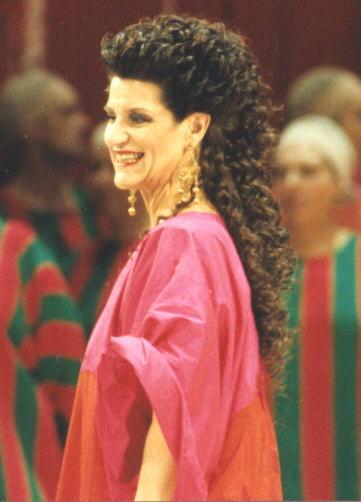
At last to see Agnes Baltsa in Herodiade. It was great. The Jean of the evening was Konstadin Andreev a mixture of Carreras & Domingo, very good. I missed Ferruccio Furlanetto's Phanuel and Juan Pons' Herode. And my favourite Salome is Eliane Coelho.
Wiener Staatsoper
montag, 6. märz 2000
26, Aufführung in dieser Inszenierung
Hérodiade
Oper in dreizehn Bildern von Paul Milliet,
Henri Grémont und Angelo Zanardini
Musik von Jules Massenet
Musikalische Leitung Reynald Giovaninetti
Szenische Konzeption
und Gestaltung Richard Bletschacher
Hermann Nitsch
Bühnenbild und Kostüme Hermann Nitsch
Chorleitung Ernst Dunshirn
OD Travel
Posted by
operaduets
at
Tuesday, March 06, 2018
0
comments
![]()
Labels: 03_March, 03-06, 2000, Agnes Baltsa, Austria, Georg Tichy, HERODIADE, JULES MASSENET, Kostadin Andreev, Nancy Gustafson, Opera, Vienna
Friday, March 2, 2018
March 2, 2002: Jenufa in Vienna
2002-03-02 Jenufa (L. Jánácek), Wiener Staatsoper
Die alte Buryja = Anny Schlemm
Laca Kiemen = Jorma Silvasti
Stewa Buryja = Torsten Kerl
Die Küsterin Buryja = Agnes Baltsa
Jenufa = Angela Denoke
Altgesell = Wolfgang Bankl
Dorfrichter = Walter Pink
Seine Frau = Helene Ranada
Karolka = Renate Pitscheider
Schäferin = Stella Grigorian
Barena = Cornelia Salje
Jana = Ileana Tonca
Tante = Waltraud Winsauer
Seiji Ozawa, conductor
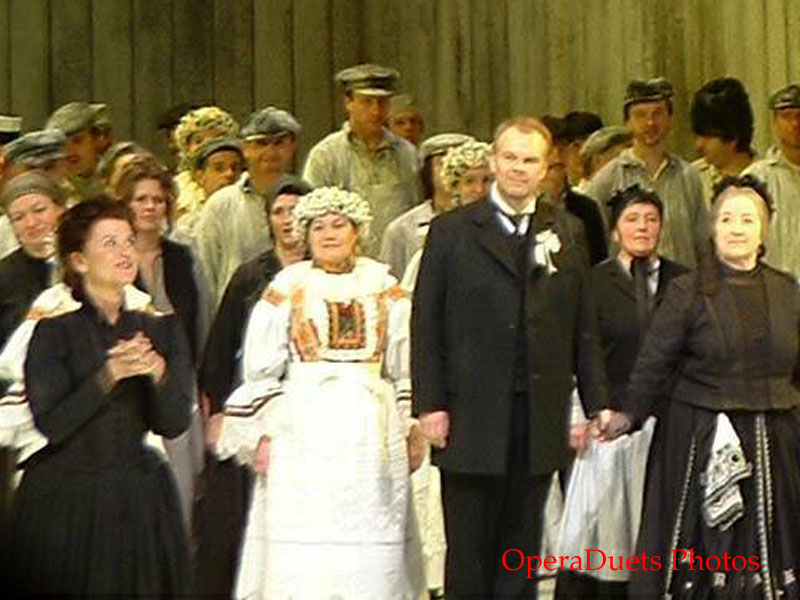
And March arrived, at last it was my turn to experience JENUFA. The good reviews made me look even more impatiently towards this day, 2002-03-02. I had read some different synopsis of this opera, and that was what I knew. After a night on the bus, from Kaupanger to Oslo, and then fly to Vienna via Copenhagen. I had some difficulty in finding my hotel, Hotel am Schubertring, but luckily I had my Vienna map with me. It was spring in Vienna, and I was coming from winter in Norway. My feet got hot, but I had with me shoes for the opera night, so I switched shoes in Stadtpark. I had to wait a bit for my hotel room, but when I got my room, it looked more expensive than I had thought. Luckily the price was right.
As always in Vienna, I visited Arcadia Opera Shop and EMI Austria in Kärtnerstrasse. Wonderful photos (Arcadia) of Agnes Baltsa at the Opernball 2002 and in JENUFA. I bought them naturally. Then I bought Manon Lescaut, Samson et Dalila and Traviata with José Cura (EMI Austria) just to be able to critize them in my Jose Cura website.
After some headache pills, a little Coca-cola, a bath, and a change. OPERA-TIME:
An enthusiastic audience applauded the conductor Seiji Osawa just more and more as the evening commenced. From first note it was beautiful music. Another role that Agnes Baltsa could fill in an eminent way. She was fantastic. WUNDERBAR. Angela Denoke who sang JENUFA had a beautiful and full soprano voice. (Her voice was like Sachertorte). She was very free in her movement, she was moving very well onstage. And she danced like was she a dancer, and not opera singer. KERL and SILVASTRI was great as Stewa and Laca. Anny Schlemm as the grandmother was also very good. A really good production. The singing was in German, probably the best solution since no Czech singers was singing.
The stars of the evening was, without doubt, Seiji Osawa & Agnes Baltsa.
A strong cast, a wonderful chorus and orchestra. The scenography, the director and conductor , and naturally the costumes, all to make it a wonderful production.
Without Agnes Baltsa as Kostelnicka, no JENUFA!
OD Travel + Photos
Posted by
operaduets
at
Friday, March 02, 2018
0
comments
![]()
Labels: 03_March, 03-02, 2002, Agnes Baltsa, Angela Denoke, Austria, JENUFA, Jorma Silvasti, LEOS JANACEK, Opera, Vienna
Wednesday, February 28, 2018
February 28, 2004: I Puritani in Vienna
2004-02-28 I Puritani (Bellini), Wiener Staatsoper
Lord Gualtiero Valton = Goran Simic
Sir Giorgio = Alastair Miles
Lord Arturo Talbot = Joseph Calleja
Sir Riccardo Forth = Manuel Lanza
Sir Bruno Roberton = Benedikt Kobel
Enriquetta di Francia = Caitlin Hulcup
Elvira = Stefania Bonfadelli
Stefan Soltesz, conductor
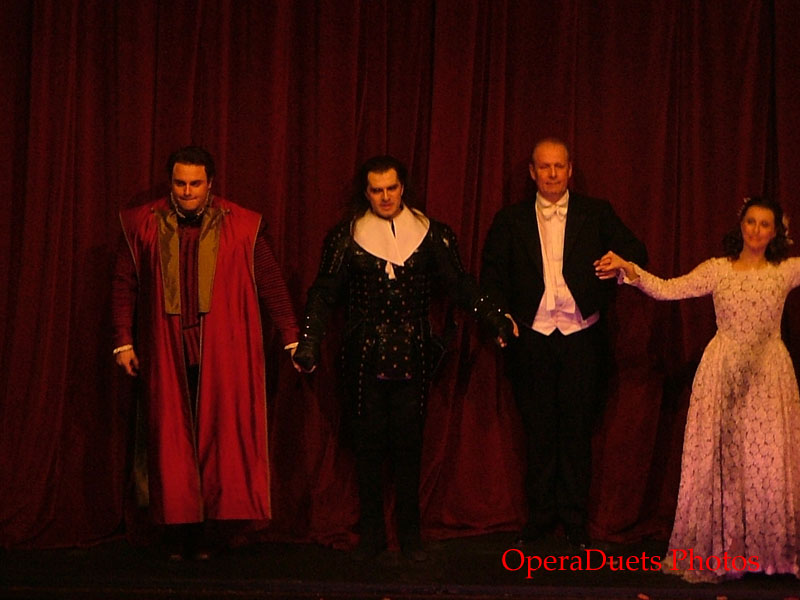
I PURITANI
(Vincenzo Bellini)
WIEDERAUFNAHME
(36. Aufführung in dieser Inszenierung)
Inszenierung: John Dew
Bühnenbild: Heinz Balthes
Kostüme: José Manuel Vazquez
Chorleitung: Ernst Dunshirn
After Signierstunde Carreras in Karajan Center it is time to see if my photos are ready. They are not. Back to the hotel to relax before the opera. I decide that I have time to go to Westbahnhof and to use the Internet café there, I do so. Then suddenly little time left. Unfortunately my irregularly eating have made my stomach uneasy. Luckily the Opera Toilette is there, and at the sound of Strauss I get "ready" for the opera. Hungry, feeling a bit sick and tired. But when I sit down and opera starts... the opera I Puritani by Vincenzo Bellini... then I don't feel so sick and tired. I can enjoy it.
I saw this opera earlier with Gruberova as Elvira. I was disappointed when I heard that she was ill. Stefania Bonfadelli replaced her. Last time I saw Bonfadelli was as Lucia di Lammermoor. But this time I really was positively attracted to her voice. This time I heard this warm voice and she was adorable. After just a few moments I did not miss Gruberova at all. Joseph Calleja, the young Maltese tenor (only 24) was wonderful as Arturo. The music of Bellini also was a revelation to me.
And I must tell of the impact that the subtitling that we got in the Wiener Staatsoper. I sat there and just decided not to read the synopsis of the opera. Last time I saw Puritani I bought a Libretti and sat desperately reading it in the pauses. But now relaxed and just see the history evolve before my very eyes. It meant that I did not know the ending of the opera. At the beginning I did not know who was singing but that cleared up. Wonderful singing. MAGIC.
Colored light. I can understand the Red color when the king of England is beheaded, all the statues also beheaded with heads on one side of the stage, the bodies in the rear of the stage. Blood.
Orange. When Arturo and Elvira meets in the forest. I would have thought Green was better. There were other colors in the production, purple... But really it seemed often superficial. But the production was otherwise very good.
BRAVA!! BRAVO !! Bravissimo!!
OD Travel + Photos
Posted by
operaduets
at
Wednesday, February 28, 2018
0
comments
![]()
Labels: 02_February, 02-28, 2004, Austria, Joseph Calleja, Manuel Lanza, Opera, PURITANI, Stefania Bonfadelli, Vienna, VINCENZO BELLINI
Tuesday, February 27, 2018
February 27, 2004: Jose Carreras Gala in Vienna
2004-02-27 Carreras Gala, Wiener Staatsoper
Part 1: Recital
José Carreras, tenor
Lorenzo Bavaj, piano
Part 2: Sly (act 3)
by Ermanno Wolf-Ferrari
Sly = José Carreras
Dolly = Isabelle Kabatu
Diener = Boaz Daniel
David Giménez, conductor
Part 3: Carmen (act 4)
by Georges Bizet
Don José = José Carreras
Carmen = Agnes Baltsa
Escamillo = Boaz Daniel
Mercédès = Stella Grigorian
Frasquita = Bori Keszei
David Giménez, conductor
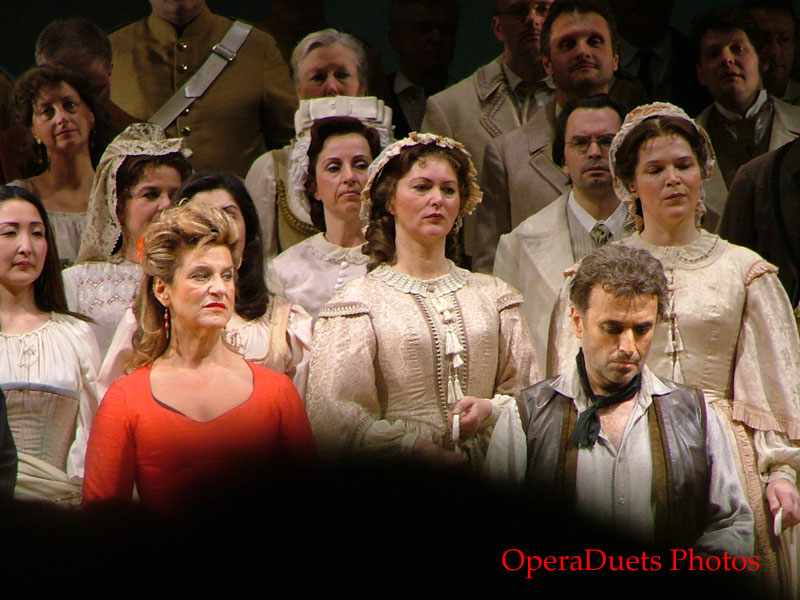
27. February 2004
José Carreras Benefit Gala,
Wiener Staatsoper.
Leukemia Foundation
30 years since Carreras made his debut in Wiener Staatsoper as the Duke in Rigoletto (1974).
Part 1:
Lieder & Arias by
Puccini, Verdi, Massenet, Cilea & Tschaikowsky.
Part 2: Sly (act 3)
by Ermanno Wolf-Ferrari
Part 3: Carmen (act 4)
by Georges Bizet
(Firma Peter Kupfer Kulturmanagment & Media.)
José Carreras Benefiz-Gala zugunsten der Leukämiestiftung
-------------A Fantastic Night at the Opera--------------------------
Traveling had given my a bit of a head-
ache, but this was a magic day, Carreras in Wiener Staatsoper again, my head-ache just had to be cured in time. After a few tablets I was almost ready for Carreras and Opera. With my new camera I came to Vienna State Opera ready for a new meeting with Carreras' voice.
The first part was Carreras and Bavaj (piano) and songs of Tosti, Leoncavallo and Puccini. I found Carreras voice a bit heavy now for the lovely love songs, but in the French songs by Leoncavallo, and finally in Puccini he was much more in his right element. His voice is definitely right for opera.
The second part was Sly, last act. You really need to have seen the whole opera to really understand the agony Sly is in and what kind of person Sly is. Carreras was a wonderful Sly. But when Isabelle Kabatu came in that was when the level started to be ethereal. God, what a divine voice, and Carreras and Kabatu was just magic together. Sly dies and Dolly rages towards the cowards that have destroyed something really beautiful. It was a really heart-wrenching scene. And Giménez does make Wolf-Ferrari´s music really into the most fantastic music.
Giménez conducted Carmen with Baltsa & Carreras, last act. What can I say other than it was fantastic? Only this, I really wanted the whole opera with Carreras and Baltsa singing conducted by David Giménez.
Of course the Vienna audience was wild with excitement and love. There were speaks by Ioan Holender in the end, and a thank-you- speech from Carreras. And after the first part a big pay-check was given to Carreras.
OD Travel + Photos
Posted by
operaduets
at
Tuesday, February 27, 2018
0
comments
![]()
Labels: 02_February, 02-27, 2004, Agnes Baltsa, Austria, Baltsa/Carreras, Concert, Gala, Isabelle Kabatu, Josep Carreras, Vienna
Friday, February 23, 2018
February 23, 2008: Pagliacci in Vienna
2008-02-23 Pagliacci (R. Leoncavallo), Wiener Staatsoper
Canio (Pagliaccio) = José Cura
Nedda (Colombina) = Tamar Iveri
Tonio (Taddeo) = Georg Tichy
Beppe (Arlecchino) = Ho-yoon Chung
Silvio = Morten Frank Larsen
Erster Bauer = Jens Musger
Zweiter Bauer = Wolfgang Igor Dentl
Marco Armiliato, conductor
Pagliacci
Inszenierung: Jean Pierre Ponnelle
Bühnenbild und Kostüme: Jean Pierre Ponnelle
Wonderful Pagliacci, such a relief after Cavalleria Rusticana. It was not that CavRust was bad, just that is was so disturbing to see the village people being so demonstrative unkind to Santuzza.
Pagliacci, on the other hand is a happy tale in the beginning and only ends bad. The Direktion of the Staatsoper asked Jose Cura to sing the Prologue and he did a wonderful Prologue and so it was only fitting that JC also had the last word "La commedia è finita". This Canio really had a good heart but a bad temper. I have seen this production before in Vienna, but this was the best one, obviously revamped the acting. Tamar Iveri was wonderful as Nedda.
Hard to say more than BRAVI, tutti!
OD Travel + photos
4 Travel to Vienna/Florence: 23 February Cav/Pag
For more reviews from my travels, see www.operaduetstravel.com
If you want to see more photos from my OperaDuets Travels, go to www.operaduetsphotos.com
Posted by
operaduets
at
Friday, February 23, 2018
0
comments
![]()
Labels: 02_February, 02-23, 2008, Austria, Gerog Tichy, José Cura, Opera, PAGLIACCI, RUGGERO LEONCAVALLO, Tamar Iveri, Vienna
February 23, 2008: Cavalleria Rusticana in Vienna
2008-02-23 Cavalleria Rusticana (P. Mascagni), Wiener Staatsoper
Santuzza = Georgina Lukács
Turiddu = Peter Seiffert
Alfio = Alberto Mastromarino
Mamma Lucia = Daniela Denschlag
Lola = Roxana Constantinescu
Marco Armiliato, conductor
Cavalleria Rusticana
Inszenierung: Jean Pierre Ponnelle
Bühnenbild und Kostüme: Jean Pierre Ponnelle
I suffered so with this Santuzza, the rejection of the villagers and even priests and children. It was almost unbearable to watch. I have never felt such a depression from this opera before. I felt that I was in this village that was so closed to kindness. Georgina Lukács was wonderful as Santuzza. Acting and with her voice. Really sad that it is the women who suffer most in such a patriarchal culture. When Turriddu was killed ...
Innegiamo with Lukács was a great moment of rare beauty and sense of kindness....
OD Travel + photos
4 Travel to Vienna/Florence: 23 February Cav/Pag
For more reviews from my travels, see www.operaduetstravel.com
If you want to see more photos from my OperaDuets Travels, go to www.operaduetsphotos.com
Posted by
operaduets
at
Friday, February 23, 2018
0
comments
![]()
Labels: 02_February, 02-23, 2008, Alberto Mastromarino, Austria, CAVALLERIA RUSTICANA, Gerogina Lukacs, Opera, Peter Seiffert, PIETRO MASCAGNI, Vienna
Thursday, February 22, 2018
February 22, 2008: Nabucco in Vienna
2008-02-22 Nabucco (G. Verdi), Wiener Staatsoper
Nabucco = Alberto Gazale
Ismaele = Marian Talaba
Zaccaria = Giacomo Prestia
Abigaille = Maria Guleghina
Fenena = Elisabeth Kulman*
Il Gran Sacerdote di Belo = Goran Simic
Abdallo = Benedikt Kobel
Anna = Caroline Wenborne*
Pier Giorgio Morandi, conductor
Two * role-debuts in Vienna State Opera. My sympathy lies with Abigaille. One could play her as just a power-hungry bitch. But then she is incomplete and you would oversee vital clues. She is Nabucco's daughter, or so she believes. She loves her father who all the time shows his affections is only for Fenena. Abigaille want to be loved. But even her love-interest love Fenena. But Abigaille is the daughter who really steps in Nabucco's shoes. For both Nabucco and Ismaele (the man she loves) she is willing to let go of power and instead of being Queen/Princess to be loved and love. If you really listen to what Abigaille says to Ismaele and Nabucco then you can hear a lot of compassion and love. But naturally Abigaille is really a complicated woman.
In the duet between Nabucco and Abigaille when Nabucco longs for Fenena, she says "You have another daughter" and runs towards him, and he rewards her with you are just a slave's daughter. Later he tries to save Fenena but Nabucco misses vital clues. Had he listened he would have understood to try to give Abigaille the kingdom (You shall be the Queen) is the wrong move, had he offered her "give me my daughter Fenena back and then then you too will be my daughter, and I will be you father) then I think things would be different. But he only sees the power-hungry woman and not a woman who wants her father's affection.
I see all the other characters in Nabucco as more fanatical and dangerous. Nabucco is a blood-hungry lion and so is Zaccaria even if Zaccaria is more religious. Ismaele and Fenena is also hard-hearted towards Abigaille and a bit fanatical. Of course the high-priest of Belo is fanatical. So Abigaille is the only one that is human and when Maria Guleghina sings Abigaille who cannot love her...
The Vienna production of Nabucco:
Inszenierung: Günter Krämer
Bühne: Petra Buchholz
Bühne: Manfred Voss
Kostüme: Falk Bauer
Licht: Manfred Voss
Musikalische Studienleitung: Jendrik Springer
I never quite liked it.
1- During the overture children acted like they were Abigaille, Fenena, Ismaele and Zaccaria in the children's room. That play did not give me anything.
2- This production uses the Holocaust in a way that I really don't think fits, not to the opera, and not at all, it seem like abuse of that great tragedy.
3- And the Holocaust reference would not be universally understood unless you have seen photos of Jews waiting with their luggage at the train station and read enough to understand what terrible places they were really going to.
Otherwise the production works very enough.
THE SINGERS
Maria Guleghina was a wonderful Abigaille. Her singing and acting was superb. She showed all the nuances of Abigaille. GREAT!
Alberto Gazale was really coming to be a Nabucco to be listening too. A bit weak in the beginning but then he really found his voice and was from that point on a Nabucco to be counted on. Leo Nucci, Renato Bruson, Juan Pons was great as Nabucco and now a new Nabucco has arrived. And I loved it how he when Abigaille came in dying to the stage I saw compassion in this last scene of the opera. GREAT!
Elisabeth Kulman sang Fenena. A beautiful voice, did her part wonderfully, one really hopes she gets a role she can shine into. Fenena is a small part. But she did it well!!
Marian Talaba was Ismaele. He really did sing and act well. A great part for Marian Talaba!
Goran Simic as the Great Priest of Belo (Baal) was really impressing this time. Full-bearded and full-voices. Great!!
Abdallo = Benedikt Kobel (did well)
Caroline Wenborne as Anna was a disappointment. Such a small role and she managed to be so very late in her most important moment "Oh fratelli, perdonate! Un'Ebrea salvato egli ha."
Giacomo Prestia as Zaccaria was really impressing. Rich voiced and acting well. GREAT!!
And after the opera: Maria Guleghina talked to her fans in fluent Italian and was the sweetest person. I even got to talk to her. WOW, I got even more a fan of her after that encounter!!!!!!!!!!!!!!
VIVA MARIA GULEGHINA!!!!!!!!
OD Travel + Photos
Original blog-post
For more reviews from my travels, see www.operaduetstravel.com
If you want to see more photos from my OperaDuets Travels, go to www.operaduetsphotos.com
Posted by
operaduets
at
Thursday, February 22, 2018
0
comments
![]()
Labels: 02_February, 02-22, 2008, Alberto Gazale, Austria, Giacomo Prestia, GIUSEPPE VERDI, Maria Guleghina, Marian Talaba, NABUCCO, Opera, Vienna
Tuesday, February 20, 2018
February 20, 2010: Pagliacci in Vienna
2010-02-20 Pagliacci (R. Leoncavallo), Wiener Staatsoper
Canio (Pagliaccio) = José Cura
Nedda (Colombina) = Nicoleta Ardelean
Tonio (Taddeo) = Lado Ataneli
Beppe (Arlecchino) = Herwig Pecoraro
Silvio = Tae Joong Yang
Erster Bauer = Jens Musger
Zweiter Bauer = Wolfram Igor Derntl
Asher Fisch, conductor
José Cura plays Canio as a drunkard from beginning to end with serious violence problems. I did not really get Lado Ataneli's Tonio. I found him enjoyable to see and hear but I did not understand Tonio at all. Canio was easy to get into. Nicoleta Ardelean was giving her first time in Staatsoper as Nedda. She was also good and improved during the performance. The other roles was also solidly sung and acted. This time Tonio gets the Prologue.
José Cura in der Materialschlacht - DiePresse.com
Die Presse seemed not to like José Cura at all. But loved Lado Ataneli as Tonio. A better Tonio than Jago. I saw Lado Ataneli as Jago in Hamburg 6 years and I think it was a better role for him. But of course that was in 2004.
Jean Pierre Ponelle - Regie, Scenography and Costumes
OD Travel + Photos
Cavalleria Rusticana/Pagliacci in Vienna (20.2.2011)
For more reviews from my travels, see www.operaduetstravel.com If you want to see more photos from my OperaDuets Travels, go to www.operaduetsphotos.com
Posted by
operaduets
at
Tuesday, February 20, 2018
0
comments
![]()
Labels: 02_February, 02-20, 2010, Austria, José Cura, Lado Ataneli, Nicoleta Ardelean, Opera, PAGLIACCI, RUGGERO LEONCAVALLO, Vienna
February 20, 2010: Cavalleria Rusticana in Vienna
2010-02-20 Cavalleria Rusticana (P. Mascagni), Wiener Staatsoper
Santuzza = Dolora Zajick
Turiddu = José Cura
Alfio = Alberto Mastromarino
Mamma Lucia = Auro Twarowska
Lola = Roxana Constanisnescu
Asher Fisch, conductor
José Cura first performance in Vienna State Opera as Turriddu in Cavalleria Ructicana was a gigantic success. From the first moment I heard a tenor in great vocal shape. The Siciliniana was beautifully sung. His acting abilities makes him a superb Turriddu. Dolora Zajick was a good Santuzza, vocally and acting.
Aura Twarowska also sang for the first the role of Mamma Lucia in Vienna State Opera on February 20, 2010. She was great. Alberto Mastromarino was his usual Alfio, vocally not quite as great as I have heard him on earlier CavRust performances. Lola, Roxana Constantinescu, was also solidly sung.
As it was not the first time I saw this Jean-Pierre Ponelle production I noticed some small changes that made it even more clear what cruel situation Santuzza is in here. Even more pointing fingers than before. More hypocrisy. This time I think Alfio and all the village knows about Lola and Turriddu. They know about Turriddu and Santuzza too, why else would they be so cruel to Santuzza. Because Lola is married to a rich and powerful man, Alfio, in this village they pretend she is good. Because Santuzza had the mark of evil, read hear, and comes from the poor part of the village she is easy target. Turriddu is accepted although they don't really see much in him, he is a drunkard, because he is after all a man. And a man can do no evil, unless outed by another man.
Regie, Scenography and Costumes = Jean-Pierre Ponelle
OD Travel + Photos
Cavalleria Rusticana/Pagliacci in Vienna (20.2.2011)
For more reviews from my travels, see www.operaduetstravel.com If you want to see more photos from my OperaDuets Travels, go to www.operaduetsphotos.com
Posted by
operaduets
at
Tuesday, February 20, 2018
0
comments
![]()
Labels: 02_February, 02-20, 2010, Alberto Mastromarino, Austria, CAVALLERIA RUSTICANA, Dolora Zajick, José Cura, Opera, PIETRO MASCAGNI, Vienna
Tuesday, February 13, 2018
February 13, 2004: Andrea Chenier in Vienna
2004-02-13 Andrea Chenier (Giordano), Wiener Staatsoper
Andrea Chenier = José Cura
Maddalena di Coigny = Norma Fantini
Carlo Gérard = Renato Bruson
Bersi = Elina Garanca
Gräfin di Coigny = Waltraud Winsauer
Madelon = Mihaela Ungureanu
Roucher = Boaz Daniel
Pietro Fléville = Hans Peter Kammerer
Fouquier Tinville = Goran Simic
Mathieu = Wolfgang Bankl
Abbé = Benedikt Kobel
Incroyable = Michael Roider
Hauhofmeister = Marcus Pelz
Dumas = Peter Köves
Schmidt = Johannes Wiedecke
Marcello Viotti, conductor
13. Februar 2004
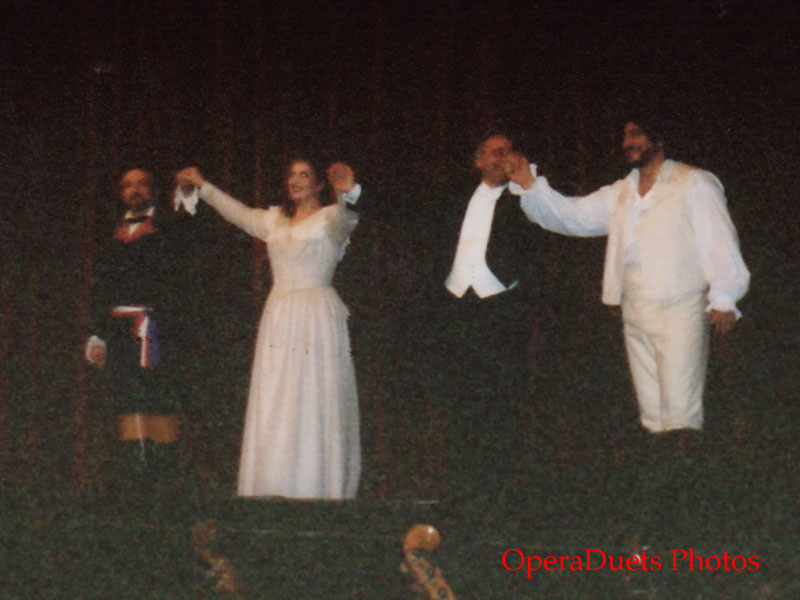
ANDREA CHÉNIER
(82. Aufführung in dieser Inszenierung)
Dirigent: Marcello Viotti
nach einer Inszenierung von: Otto Schenk
Bühnenbild: Rolf Glittenberg
Kostüme: Milena Canonero
Choreinstudierung: Ernst Dunshirn
Beginn: 19.30
about Andrea Chenier
ANDREA CHENIER, Wiener Staatsoper 13.2.04.
Wonderful production of this most known opera by Umberto Giordano. But I must confess that I was not convinced this was José Cura's best performance as Andrea Chenier. Not that I regret coming to Vienna for this Andrea Chenier. It was interesting to see Renato Bruson as Carlo Gerard and Norma Fantini as Maddalena di Coigny.
But I found the overall impression was not convincing . But the house agreed on Boaz Daniel as Roucher was wonderful. In my opinion José Cura acted Andrea Chenier wonderfully, but sang less good. Pronunciation and timing was somewhat lacking. Renato Bruson was great as Carlo Gerard, but unluckily for me I find his voice a little too hard. Norma Fantini also great as Maddalena, but lacked some of the vocal weight that I heard she had when she sang Aida in Munich (2002). Margareta Hintermeier did not sing the role of the Countess (Maddalena's mother) and I wonder if not that would have made a difference, more weight and drama in this small role.
Madelons aria is always a highlight in the 2 act, but this time it could have easily been overlooked. It is usually quite emotional to listen to this aria. And when the judges came in the judgement scene I did not feel any weight and could not see who they were and neither did I feel the terror that the people feel when the terrible judges come. So act 3 was a little blass.
In the whole the crowd scene was not really good represented on the stage. Very few angry men did get into the gilded house during the party in act 1, the house guests outnumbered them. The crowds was really small and in this huge stage it almost looked stupid, it is afterall supposed to be Paris, a rather overcrowded city.
OD Travel + Photos
Posted by
operaduets
at
Tuesday, February 13, 2018
0
comments
![]()
Labels: 02_February, 02-13, 2004, ANDREA CHENIER, Austria, Elina Garanca, José Cura, Norma Fantini, Opera, Renato Bruson, UMBERTO GIORDANO, Vienna
Saturday, February 10, 2018
February 10, 2009: Stiffelio in Vienna
2009-02-10 Stiffelio (Verdi), Wiener Staatsoper
Stiffelio = José Cura
Lina = Hui He
Stankar = Anthony Michaels-Moore (a)
Stankar = Mark Rucker (s)
Raffaele = Gergely Németi
Jorg = Alexandru Moisiuc
Federico = Benedikt Kobel
Dorotea = Elisabeta Marin
Michael Halász, conductor
Fault no.1: Anthony Michaels-Moore is onstage acting Stankar, but his name is not in the role lists, no mention of him at all. Fault no 2: Mark Rucker is beside the stage singing the role of Stankar with his notes before him, the role list says he is Stankar, but he is not onstage in costume. Fault no 3: the orchestra under Michael Halasz often sound like there is several orchestra members missing, and the conductor is careless so that the singers suffers, they have to fight to come in right on time.
The singers are wonderful. This Stiffelio seemed to have microphones for the radio broadcast. Saturday that was the superior performance was not broadcast, why? Because of the change in baritone, really?? Bad decision, and then to slight 2 baritones in one (see Fault 1+2). I found the acting of Anthony Michaels-Moore worth mentioning, he is great. But still I was disturbed when I understood that Mark Rucker would not be allowed to act as Stankar. If it was the will of either baritones then I will be content, but if it was the management then I really don't understand it. The audience that had not been there on Saturday was understandably confused. If only they had mentioned Anthony Michaels-Moore. M-M who acted admirably was too ill to be there for all the applause, so why wasn't he allowed to rest. If Mark Rucker would have to do some improvising then I would be sure the rest of the cast would have been up to it.
I have read two reviews of this Stiffelio, both praises the baritone Mark Rucker. One said that Jose Cura was no longer a Tenor Crown Prince, meaning he was no good, I guess. But the all the other got some praise. The other praised all, except Hui He who was too Diva and not Lina. Here both Jose Cura and Hui He are doing their best performances vocally and as actors, but the review doesn't like them. They are so wrong. I am really trying to understand how Jose Cura's singing could be prove that he is no longer good. I think the reviewer must already dislike his choices of how to use his voice for dramatic purposes. I can sometime disagree myself, but not this time. Hui He acting like a Diva, wow, not acting like Lina. What? Should she sing the arias bad, and then ... I really wondered, did we see the same performance?
Stiffelio
(35. Aufführung in dieser Inszenierung)
Dirigent: Michael Halász
Inszenierung: Elijah Moshinsky
Bühnenbild: Michael Yeargan
Kostüme: Peter J. Hall
Lichtregie: Paul Pyant
Choreinstudierung: Thomas Lang
Stiffelio: José Cura
Lina: Hui He
Stankar: Anthony Michaels-Moore
Raffaele: Gergely Németi
Jorg: Alexandru Moisiuc
Federico: Benedikt Kobel
Dorotea: Elisabeta Marin
Beginn: 19.30
Das Wunder Oper - Wiener Zeitung
Staatsoper: Tenor-Kronprinz? Längst gestürzt! - Die Presse
OD Travel + Photos
3 faults by Vienna Staatsoper, but Stiffelio still...
For more reviews from my travels, see www.operaduetstravel.com
If you want to see more photos from my OperaDuets Travels, go to www.operaduetsphotos.com
Posted by
operaduets
at
Saturday, February 10, 2018
0
comments
![]()
Labels: 02_February, 02-10, 2009, Anthony Michaels-Moore, Austria, GIUSEPPE VERDI, Hui He, José Cura, Mark Rucker, Opera, STIFFELIO, Vienna
Friday, February 9, 2018
February 9, 2009: Un Ballo in Maschera, Vienna
2009-02-09 Un Ballo in Maschera (Verdi), Wiener Staatsoper
Gustaf III. = Ramón Vargas
René Ankarström = Dalibor Jenis
Amelia = Indra Thomas
Ulrica Arvedson = Elisabeth Kulman
Oscar = Ileana Tonca
Christian = Marcus Pelz
Horn = Janusz Monarcha
Warting = Dan Paul Dumitrescu
Richter = Peter Jelosits
Diener = Peter Jelosits
Paolo Carignani, conductor
INDRA THOMAS triumphs as Amelia
Ileana Tonca is wonderful as Oscar. Elisabeth Kulman, who I saw as Fenena, is actually a marvel as Ulrica. For the first time the scene with Ulrica made sense, both musically and as theatre. BRAVA!!!
First in the 3 act, the masked ball, was the costume of Amelia right for Indra Thomas. If this had been a new production then I would have wondered if the old art of making attractive costumes to big bodies had gone lost. Even with her costume not being right for her Indra Thomas managed to project her inner Amelia. Her voice reminded me of Jessye Norman. My wish for Indra Thomas is that she will be recognised as a great soprano, and then she could be DIVA enough to demand costumes that sits right. That would be great for her and her audience.
The men, Ramon Vargas and Dalibor Jenis took longer to warm up. But they were also great.
This production was no doubt set in the historical time of King Gustaf III of Sweden. I really liked it.
9. Februar 2009
UN BALLO IN MASCHERA
(66. Aufführung in dieser Inszenierung)
Dirigent: Paolo Carignani
Inszenierung: Gianfranco de Bosio
Bühnenbild: Emanuele Luzzati
Kostüme: Santuzza Calì
Chorleitung: Thomas Lang
Gustaf III.: Ramón Vargas
René Ankarström: Dalibor Jenis
Amelia: Indra Thomas
Ulrica Arvedson: Elisabeth Kulman
Oscar: Ileana Tonca
Christian: Marcus Pelz
Horn: Janusz Monarcha
Warting: Dan Paul Dumitrescu
Richter: Peter Jelosits
Diener: Peter Jelosits
Beginn: 19.00
OD Travel + Photos
INDRA THOMAS triumphs as Amelia, Vienna 2009-02-09
For more reviews from my travels, see www.operaduetstravel.com
If you want to see more photos from my OperaDuets Travels, go to www.operaduetsphotos.com
Posted by
operaduets
at
Friday, February 09, 2018
0
comments
![]()
Labels: 02_February, 02-09, 2009, Austria, BALLO IN MASCHERA, Dalibor Jenis, GIUSEPPE VERDI, Indra Thomas, Opera, Ramon Vargas, Vienna
Wednesday, February 7, 2018
February 7, 2009: Stiffelio in Vienna
2009-02-07 Stiffelio (Verdi), Wiener Staatsoper
Stiffelio = José Cura
Lina = Hui He
Stankar = Anthony Michaels-Moore (a)
Stankar = Mark Rucker (s)
Raffaele = Gergely Németi*
Jorg = Alexandru Moisiuc*
Federico = Benedikt Kobel*
Dorotea = Elisabeta Marin*
Michael Halász, conductor
Cough, cough, Stiffelio in Vienna:
one sings, the other acts
I didn't. Cough, I mean, But two people did. Maybe more. Annoying.
But the real news, Anthony Michaels-Moore is sick, he cannot sing. The American Mark Rucker steps in on very short notice. So there he stood beside the stage with his partiture singing Stankar while onstage Anthony Michaels-Moore acted Stankar (only mouthing his part). Strange to see and think about but this was like advanced synchron swimming. They did it very well. The actor Michaels-Moore was great as actor, the singer Rucker was great as Stankar. Maybe MM was not great, but opera is not straight theatre, so when we think it as opera acting, not being able to sing probably meant the actor too was a bit unabled by that.
Did Stiffelio, the opera, suffer from this? No, not at all. Was the other singers affected by this? No, they were all great. Did the conductor suffer? No idea at all.
It was a great success for Mark Rucker. People were wild. I was near 3 of them who seem to come only for him. (If there is 3 it must really be plenty.)
HUI HE was wonderful as Lina. And all the audience understood they, one could hear that in the applause. She was warm and acted her role wonderfully. Wonderful voice. JOSE CURA did one of his very best Stiffelio's, if not the best. I wish I could describe how I have seen how Jose has changed with this role. One the negative side: Federico di Frengel was rather thin and old, Raffaele was tall and somewhat big and young, but in the opera it should be possible to think Federico was Raffaele. Oh, that was maybe while it was so dark lit the stage. I thought that was to make it possible to Mark Rucker to read the notes.
Anyway, Mark Rucker was the super nice and happy man with a big laugh when he came out of the opera house. Hui He was also very nice and humble. Jose Cura sat down to as many signing and photos, even until the warming all to get out of the building, the lights are soon put out. It was a relief to Jose Cura, And really the fans was not slighted a bit.
A wonderful opera night!!!!!!!!!!!!!!!!
Stiffelio
(34. Aufführung in dieser Inszenierung)
Dirigent: Michael Halász
Inszenierung: Elijah Moshinsky
Bühnenbild: Michael Yeargan
Kostüme: Peter J. Hall
Lichtregie: Paul Pyant
Choreinstudierung: Thomas Lang
Stiffelio: José Cura
Lina: Hui He
Stankar: Anthony Michaels-Moore (acts)
Stankar: Marck Rucker (sings)
Raffaele: Gergely Németi*
Jorg: Alexandru Moisiuc*
Federico: Benedikt Kobel*
Dorotea: Elisabeta Marin*
(* Rollendebüt an der Wiener Staatsoper)
Beginn: 19.30
OD TRAVEL + Photos
For more reviews from my travels, see www.operaduetstravel.com
Cough, cough, Stiffelio in Vienna: one sings, the other acts
If you want to see more photos from my OperaDuets Travels, go to www.operaduetsphotos.com
Posted by
operaduets
at
Wednesday, February 07, 2018
0
comments
![]()
Labels: 02_February, 02-07, 2009, Anthony Michaels-Moore, Austria, GIUSEPPE VERDI, Hui He, José Cura, Mark Rucker, Opera, STIFFELIO, Vienna
Saturday, January 20, 2018
January 20, 2014: I due Foscari in Vienna
2014-01-20 I due Foscari (Verdi), Theater an der Wien
Francesco Foscari = Plácido Domingo
Jacopo Foscari = Arturo Chacón-Cruz
Lucrezia Contarini = Davinia Rodriguez
Jacopo Loredano = Roberto Tagliavini
Barbarigo = Andrew Owens
Pisana = Gaia Petrone
Fante = Ioan Hotea
Servo del Doge = Marcell Attila Krokovay
James Conlon, conductor'
ORF Radio-Symphonieorchester Wien
Arnold Schoenberg Chor (Ltg. Erwin Ortner)
Inszenierung - Thaddeus Strassberger
Bühne - Kevin Knight
Kostüme - Mattie Ullrich
Licht - Bruno Poet
I DUE FOSCARI by Giuseppe Verdi. Different from La Gioconda in many ways. Verdi's music sings of the waters surrounding Venice, the production tells of a cruel world filled up with torture and the unlucky souls caught up in the power games of the Counci of Ten. The lauded Fairness of Venice is that even a son of the current Doge can be caught in the web. Fairness, they call it, and pity as cruel verdicts is given both father and son Foscari.
La Gioconda is a Venice of later centuries than the story of the two Foscari. Whether or not Jacopo Foscari is guilty his treatment is too cruel to be fair. To our eyes Torture is never acceptable and we should never be willing to trade that truth. In the century of Foscari torture was used often, but was it thought acceptable then? Due Foscari had a lot of torture going on onstage. I hated that, but it was not put there on a whim, it was telling the story. I am just not a fan of cruelty onstage but even more do I object to the cruelty of torture and courts of law where the law is followed in such a way that it is a mockery of human lives and their sanctity. It is an important lesson but are we willing to see it as it happens now somewhere on the planet and work against the ills of our world.
Arturo Chancun-Cruz was able to justice to Jacopo Foscari, singing as a god as Jacopo was tortured on stage. That must have taken a lot of will power. Behind the scenes and onstage people must have really been learning a lot of safety features unssen by the audience as all that torture happened.
Davinia Rodriguez as Jacopo's wife, Lucrezia Contarini, had so many different palettes of sounds. In the end she would win the audience heart. The hardest role was hers and she was amazing.
Placido Domingo as the old Doge Francesco Foscari. Unhappy father and now he was to lose his last son. The implacable enemy wanted all Foscaris gone and dealt with and with the power of the Council of Ten in his hands he had the power, The Doge dies utterly unhappy with no shame spared. Loredano uses a mock pity is used to knife his victims.
Foscari has not yet drawn fully his last breath before the new Doge in crowned. Loredano' justice has been served.
I DUE FOSCARI is a masterpiece just like La Gioconda. The story of Foscari is part of the history of Venice. La Gioconda is a story that happens to be in Venice.
OD Travel & Photos
Original blog post
For more reviews from my travels, see www.operaduetstravel.com If you want to see more photos from my OperaDuets Travels, go to www.operaduetsphotos.com
Posted by
operaduets
at
Saturday, January 20, 2018
0
comments
![]()
Labels: 01_January, 01-20, 2014, Arturo Chacon-Cruz, Austria, Davinia Rodriguez, GIUSEPPE VERDI, I DUE FOSCARI, James Conlon, Placido Domingo, Vienna
Saturday, January 13, 2018
January 13, 2002: Parsifal in Vienna
2002-01-13 Parsifal (R. Wagner), Wiener Staatsoper
Amfortas = Bernd Weikl
Titurel = Peter Wimberger
Gurnemanz = Kurt Rydl
Parsifal = Placido Domingo
Klingsor = Wolfgang Bankl
Kundry = Violeta Urmana
Peter Schneider, conductor
Peter Schneider was the right conductor for Parsifal.
Kurt Rydl was great as Gurnemanz, but not as tall as Matti Salminen, and that was a pity. Because in Madrid where M. Salminen sang Gurnemanz, he was always the tallest onstage, and that is almost a requirement in this role. Bernd Weikl too was great, as Amfortas, but I think Madrid's Grundheber was better. As in Madrid: Wolfgang Bankl was Klingsor, and he was great, too.
And this Parsifal was great, but now we come to the center of the question, Parsifal and Kundry. Plácido Domingo and Violeta Urmana. It was the Placido Domingo who sang the best German, without a false word, the Spaniard was better than the German-speaking singers in the language test of Parsifal. Violeta Urmana, in her attempt to sing correct German, seem to loose out meaning in the search of pronounciation.
The Kundry of Violeta Urmana was unexciting, boring in both act1 and 3. Only in Act 2 did she manage to be any thing called exciting because of the beautiful dress she was wearing. Where Agnes Baltsa gave heart and soul into Kundry, only belcanto from Urmana.
Plácido Domingo, the final judgment: he is a great Parsifal. still young. Forever young.
13.JANUARY 2002 17:00
-----
Parsifal
Ein Bühnenweihfestspiel von Richard Wagner
DirigentPeter Schneider
Inszenierung August Everding
Ausstattung Jürgen Rose
Choreographie Ray Barra
Chorleitung Ernst Dunshirn
" ..
Kundry - Violeta Urmana*
Erster Knappe - Cornelia Salje*
Zweiter Knappe - Michelle Breedt
Dritter Knappe - Walter Pauritsch
Vierter Knappe - Michael Roider
Erster Gralsritter - Benedikt Kobel
Zweiter Gralsritter - Peter Köves
Blumenmädchen 1 Gruppe - lngrid Kaiserfeld
Judith Halász*
Stella Grigorian
2 Gruppe - Simina Ivan
Renate Pitscheider
Michelle Breedt
Stimme von oben - Michelle Breedt
* Rollendebüt an der Wiener Staatsoper
ODTravel
Posted by
operaduets
at
Saturday, January 13, 2018
0
comments
![]()
Labels: 01_January, 01-13, 2002, Austria, Bernd Weikl, Kurt Rydl, Opera, PARSIFAL, Peter Schneider, Placido Domingo, RICHARD WAGNER, Vienna, Violeta Urmana
Friday, January 12, 2018
January 12, 2013: L'Italiana in Algeri, Vienna
OperaDuets Travel & Photos
Original Blog Post
Posted by
operaduets
at
Friday, January 12, 2018
0
comments
![]()
Labels: 01_January, 01-12, 2013, Agnes Baltsa, Alfred Sramek, Antonino Siragusa, Austria, Ferruccio Furlanetto, GIOACCHINO ROSSINI, ITALIANA IN ALGERI, Jesus Lopez-Cobos, Vienna
